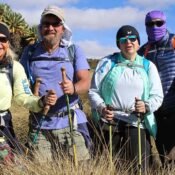Vaccinations and Immunizations
Vaccinations to Climb Kilimanjaro

A month or two before your trip to Tanzania, you should schedule a visit at your local travel clinic or with your doctor to discuss vaccines. It’s a good idea to do this early so that any adverse effects you may experience are resolved before you leave.
There are no necessary vaccines required for climbing Kilimanjaro, with the exception of Yellow Fever, which must be obtained by any person entering Tanzania from a country deemed a danger zone for Yellow Fever.
Consider where you’ll be traveling before and after your hike.
Important Information about Yellow Fever
If you arrive in Tanzania on a flight from a Yellow Fever zone, you may be requested to show your Yellow Fever vaccination certificate. A list of these countries is provided below.
Angola, Benin, Burkina Faso, Burundi, Cameroon, Central African Republic, Chad, Republic of Congo, Democratic Republic of the Congo, Côte d’Ivoire, Equatorial Guinea, Ethiopia, Gabon, Gambia, Ghana, Guinea, Guinea-Bissau, Kenya, Liberia, Mali, Mauritania, Niger, Nigeria, Rwanda, Senegal, Sierra Leone, South Sudan, Sudan, Togo, and Uganda.
Even if you are merely transiting through one of these countries and do not intend to leave the airport, the regulations stipulate that you must provide proof of vaccination if you have been there for more than 12 hours. This can be problematic during flight delays.
You must be vaccinated 10 days before your anticipated date of departure, and some passengers have reported negative effects from the vaccination, so we encourage doing it as soon as possible. A certificate is not required for travelers traveling directly into Tanzania from Europe or the United States.
What vaccinations do I need for Kilimanjaro? Recommended Vaccinations
The Centers for Disease Control and Prevention recommends the following vaccines for visitors to Tanzania. It is up to you and your healthcare practitioner to choose which, if any, are best for you.
Your routine inoculations
It is advised that you have received all of your usual vaccines, including MMR (measles, mumps, and rubella), chickenpox, Diptheria, tetanus, polio, and your annual flu shot.
1. Vaccinations and Immunizations: Hepatitis A & B
We urge that you chat to your doctor about hepatitis immunizations. Hepatitis A is spread by contaminated food and water (such as salads, unpeeled fruits, and shellfish) as well as ice in beverages. You can contract Hepatitis A even if you do not travel to distant locations.
Hepatitis B is spread mostly by body fluids and needles. If you require medical treatment in a remote place, work in healthcare, or are sexually active, you should think about it.
2. Vaccinations and Immunizations: Typhoid
It’s not uncommon to be exposed to typhoid in Africa as it’s transmitted through contaminated food and water. Ice in your drinks, eating at street-food markets, poor hygiene, eating raw food or traveling to rural areas.
3. Tetanus
It’s easy to overlook our 10-yearly tetanus vaccine. Tetanus is more likely to affect you if you cut yourself; it can be found in dirt and animal excrement. If you travel frequently, it’s important to keep this vaccination up to date.
4. Rabies
Your risk of contracting rabies is low, especially if you do not intend to travel to Tanzania before or after your climb. Usually spread by a bite from an infected animal (often a dog), you and your doctor will determine whether or not you need it.
5. Vaccinations and Immunizations: Cholera
A nasty waterborne disease spread through poor hygiene. The CDC recommends vaccination if you are travelling to an area of active cholera transmission. Speak to your doctor.
6. Vaccinations and Immunizations: Malaria
Malaria is a constant danger when traveling in Tanzania, as it is across Africa. You are quite secure on the mountain because mosquitos are rarely seen over 6000 feet. However, keep in mind that you will be in Moshi or Arusha prior to and after your climb, which is when you are most vulnerable.
Malaria is a parasite that spreads by the bite of a female Anopheles mosquito. It just takes one bite to get infected, and the sickness is severe, even lethal.
Consult your doctor about antimalarial prophylaxis and which is best for you and your destination. Malarone is a popular but pricey medication that has the fewest documented negative effects. To learn more, visit the Hospital for Tropical Diseases.
A word of caution concerning Larium: this anti-malarial has been observed to have adverse effects similar to those of altitude sickness.
Taking prophylaxis (antimalarials) does not ensure that you will not develop malaria. Taking care to avoid being bitten is the only surefire approach to prevent it.
- Staying indoors between dusk and dawn (the mosquitoes are most active in the evenings)
- Wearing a strong mosquito repellent, preferably with DEET
- Always use a mosquito net over your bed when you sleep
- Spray your room with insect repellent, and treat clothes and bedding
- Wear long sleeves, trousers, and socks in the evenings
- Avoid densely populated areas, especially at night
Intestinal Trouble & Travelers Diarrhea
Travelers to rural portions of Africa are more likely to have stomach trouble. Diarrhea can be caused by parasites, viruses, or bacteria and is difficult to treat.
Being diligent about your diet, drink, and cleanliness will help you prevent pathogens like E.coli and salmonella, as well as parasites like Giardia and Cryptosporidia.
- Never drink untreated water from rivers, taps, or wells. Avoid ice unless you are sure it’s made with purified water. Boil, filter and/or purify all water before drinking.
- Avoid eating fruit that you can’t peel
- Be careful with uncooked vegetables and salads, be sure they are washed in purified water
- Make sure any meat you eat is well-cooked and avoid rare meat
- Clean hands with anti-bacterial gel before eating
On your hike, we will give you clean, filtered drinking water. All of our food is properly sourced, kept, and prepared to prevent contamination.
Medications to bring with you
Your doctor will be able to recommend the best medications for you to carry, but we suggest, in addition to any prescription medication you need:
- Antimalarials
- Ciproflaxin or a similar antibiotic to treat bacterial diarrhea
- Diamox if you are taking it – read our guide to diamox
- Ibuprofen
Before your climb, we ask you to fill in a medical questionnaire and recommend you have a full medical check-up from your doctor.
Questions? Let us know, we’re here to help.





